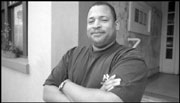“I’VE NEVER SEEN a place where people use the race card so much,” says Seattle police officer Mike Sudduth, an African American, “and when you go to the marches, all the protesters are white liberals.”
Despite Sudduth’s claims, African Americans have predominated at the ongoing protests and forums over the fatal police shooting of Aaron Roberts, though the usual contingent of white liberals and revolutionaries has turned out as well. But Sudduth’s wisecrack reflects a belief—or perhaps a hope—of some black police officers that the anti-police outrage currently emanating from the Central Area does not reflect the opinions of most African Americans in the community.
Sudduth, a boisterous officer in uniform, is speaking his mind last Thursday at a lunch meeting of the Black Law Enforcement Association of Washington, a group of about 80 officers from departments across the state. The association is holding the meeting at Thompson’s Point of View as a show of support for the Central Area soul food restaurant, which was vandalized after its owner made favorable comments about the officers involved in the Roberts shooting. From their table, the nine officers who turn up can see across the street to a chalk outline of Roberts’ body, next to graffiti that reads in part, “SPD = Nazis.”
Over chicken wings and greens, the group discusses the statement it should make about the Roberts shooting. The officers quickly agree on one they know will cause controversy, that the incident was not racially motivated and was the unfortunate result of Roberts’ own lawlessness. Some privately say they feel for Officers Greg Neubert and Craig Price, both because of the dangerous situation they faced and the intense scrutiny they are now experiencing.
The remainder of the time, the officers at the table vent feelings that are more complicated. Frustrated by African-American leaders and white liberals they see as quick to accuse police of racism but slow to speak out against crime in their communities, they also acknowledge that racism does exist within the law enforcement institutions they inhabit, sometimes even within themselves.
“There’s a problem of black-on-black crime,” laments Seattle Detective Kirby Leufroy, vice president of the black officers’ association. “Let’s march to deal with that.” Among African Americans, he adds, “It’s time for a lot of ones who have been silent to really voice their opinion.”
A longtime cop wearing a blue jacket and bifocals, Leufroy takes out a folded piece of legal paper on which he has written two inscriptions from the Martin Luther King Memorial in the Central Area, which he says he visits often seeking comfort or inspiration. He softly begins reading the first, on the theme of taking unpopular stands: “The ultimate measure of a man is not where he stands in a moment of comfort and convenience. . . .”
Meanwhile, the younger and louder Sudduth expresses skepticism at black leaders’ current call for more African-American police officers in the Central Area. “Please,” he says. African-American leaders regard black officers as sellouts, he says, and have offered no support in the past.
Yet Carlos Bratcher, president of the black officers’ association and a detective in the King County sheriff’s office, says it’s important for people to realize that the “minority community isn’t just crying wolf” regarding police racism, particularly when it comes to racial profiling. Wearing a black-checked suit and a sober expression, Bratcher believes he was himself needlessly stopped a few years back when he was more informally dressed and driving off-duty in the Central Area in an almost-new Dodge Stratus. The officers said his car matched the profile of a stolen vehicle, but Bratcher knew the they could have quickly cleared him by running his license plate. One of the officers that stopped him was black.
“I got caught up in it myself during my early state of policing,” says Detective Leufroy, referring to racial profiling. He was in New Orleans then, in one of the poorest parts of town, and he was seeing black-on-black crime constantly. “When I would get off work, and I was driving around, I started suspecting all African Americans.” It wasn’t until the subject of scapegoating came up in a criminal justice class he was taking that he realized what he was doing.
Racism, albeit subtle, is also manifest in the way police departments conduct their internal affairs, black officers say. The Black Law Enforcement Association routinely fields complaints of discrimination over promotions or discipline. (Seattle’s 122 black officers make up roughly 10 percent of the city’s force.)
At the same time, black officers are frequently called on to account for police racism in the community. “It’s been brought up every day I’ve worked, whether by friends or family,” says one black Seattle officer who’d rather not be identified. Last week, his dad asked him over lunch whether the officers in the Roberts shooting were “rednecks.” He got into a big fight with his father last year after expressing support for the officer who shot David Walker, another African American. “My dad said, ‘I grew up in the South. You don’t know the Man like I know the Man.'”
Yet not long ago when he was thinking about leaving the force for reasons unrelated to race, his father talked him out of it. “They need brothers like you,” his dad told him.
For more on the Roberts shooting, see “Church Meeting,”, and Geov Parrish’s column.








